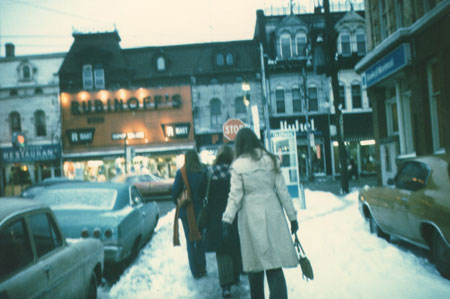You can watch, here, Prince perform a “brilliant” guitar solo at the end of the Rock & Roll Hall of Fame tribute to George Harrison in 2004.
One viewer of the Youtube video said this:
This was Prince’s response to being snubbed by Rolling Stone Magazine’s top 100 guitarists. He certainly proved his point here. And the strutting off stage at the end. Priceless.
Well, if that’s your thing.
After Tom Petty, Steve Winwood, Jeff Lynne and Dhani Harrison have played through most of a reverential rendition of the song, Prince emerges from the wings, in a black suit and a red bowler hat, poker-faced, and plays a solo of such intricacy and mournfulness that the other players shake their heads and grin with admiration. On its face, it’s a supreme expression of Prince’s superiority and bravura. But the film gives it a new context.
This is my clue about what is going on here. Forget about George: it’s not about the music. It’s not about Prince’s artistic achievement. It’s about Prince. It’s about the drama. And Sasha Weiss celebrates it. She’s a fangirl.
As for the music, come on– this is not hard to sort out. Prince dances and prances and swings his arms and fingers and, yes, he hits more notes than anyone else. That’s what his musical sensibility in this moment– which is supposed to be a tribute to one of the least showy lead guitarists of all time (George Harrison)– calls for: a fucking spectacle about himself. If your standard is volume, and speed, and quantity, he’s your thing. If you’re interested in something that matters, he might not be.
And then Prince struts off the stage. It was the musical version of a bat flip, and just as petulant and petty and banal. His fans are drunk with pleasure.
I looked up this clip in response to a New York Times Daily podcast in which Sasha Weiss, discarding any pretense of journalistic objectivity, gurgles that Prince was the “Mozart” of his generation. She raves on and on about the monumental achievements of Prince, awestruck by his decision to change his name to a symbol, blown over by his accounts of just how much suffering he endured in his life, dazzled by his spectacular stage shows, the weeping, the dancing, the emoting!
This is a feminine appreciation of Prince’s identify. It’s Taylor Swiftian. It’s all about “telling my story” (about me) and giving my fans an exhibition about me, about who loves me and who doesn’t, about who I love or don’t, about who I am.
It is interesting that this podcast should emerge in the shadow of “A Complete Unknown”, the terrific film about the early days in New York City and at the Newport Folk Festival of an authentic genius, Bob Dylan. The contrast of the two is illuminating. Name one great song by Prince about anybody other than himself, his hurt, his desire, his horniness, his frustration, his monumental glorious self, in all it’s costumed glory?
Sasha Weiss acknowledges that Prince’s legacy has been diminished over time. She laments that the documentary by Ezra Edelman, which the Prince estate has blocked from being released (they want something more fawning and adoring) will never be released because it would have restored a sense of Prince’s importance and influence.
Precisely what “A Complete Unknown” has done for Dylan. Well, no it didn’t: Dylan’s influence and importance has never really diminished at all. “A Complete Unknown” is timely because it resonates so clearly with Dylan’s reputation and esteem in the music industry, and especially among other talented singer-songwriters, including the new generation who know exactly who first established the idea that rock music could be genuinely artistic and relevant and compelling.
Another tell: Dylan had contact with the makers of “A Complete Unknown”, and, as he did for the making of “I’m Not There” by Todd Haynes, gave the director carte blanche to show whatever he wanted. The result is magnificent for Dylan. The Prince estate are too stupid to realize how an artistically compelling but honest documentary can do far more for an artist’s reputation than the usual Hollywood sycophancy.
How great is Prince, really? A sample of the genius’ lyrics:
The rain sounds so cool when it hits the barn roof
And the horses wonder who you are
Thunder drowns out what the lightning sees
You feel like a movie star
Listen, they say the first time ain’t the greatest
But I tell you, if I had the chance to do it all again, ooh
I wouldn’t change a stroke ’cause, baby, I’m the most
With a girl as fine as she was thenFrom “Raspberry Beret”.
Really?
And from another of his allegedly “great” songs, “Purple Rain”:
I never meant to cause you any sorrow
I never meant to cause you any pain
I only wanted, one time, to see you laughing
I only want to see you laughing
In the purple rain
Impressed? No, you’re not. It’s banal. I am reminded of The Tragically Hip, who also had songs that seemed inspired musically but lyrically fell flat. The lines are just sequences of images, some striking and some not, but the overall effect is dull. There’s no build, no narrative context, no real connection to any compelling insight or revelation.
Musically, Prince was amazing– no argument there. Not my type of music (because it is mostly centered on virtuosity and showiness) but for what he was trying to do, it’s impressive. But lyrically, he never moved beyond horniness and bullshit– the bullshit part being how he would love anyone forever. No he won’t. No, he didn’t.
So one of the things we consider here is weight. How much does his musical genius compensate for his lyrical banality? I would argue that you can’t separate the two. All the bombast and melodic invention and harmonies and inversions are integral to the monotonous repetition of clichés about romantic love. Songs like Dylan’s “Love is Just a Four Letter Word” or “Don’t Think Twice It’s All Right”, “It Aint Me Babe”, or “Tangled up in Blue” are more interesting musically because they are about authentic insights and experiences. He explores, reveals, illuminates. “You just kind of wasted my precious time” is a bombshell, a shot, a blast, that expands your ideas about love and distance and disappointment. “Someone who would die for you and more” caps an ascending escalator of perception of someone’s confused narcissism.
Springsteen’s “Thunder Road”– musically, far more ambitious than Dylan– has this:
There were ghosts in the eyes of all the boys you sent away
They haunt this dusty beach road in the skeleton frames of burned out Chevrolets
It resonates. The boys who longed for you but you turned away, and continue to exist as ghostly opportunity; the burned-out car, reflecting the decline of American confidence and yearning.
Leonard Cohen– I can’t even begin to list the number of lyrics he wrote that are powerful, evocative, compelling. Yes, musically– in performance– he was limited, but his songs were not. No cover of a Prince song is even close.
Or you have Prince’s (“1999”):
I was dreamin’ when I wrote this
So sue me if I go too fast
But life is just a party
And parties weren’t meant to last
This is a sophomoric conversation. It goes nowhere. And all the music in the world can’t lift it beyond it’s triviality.





